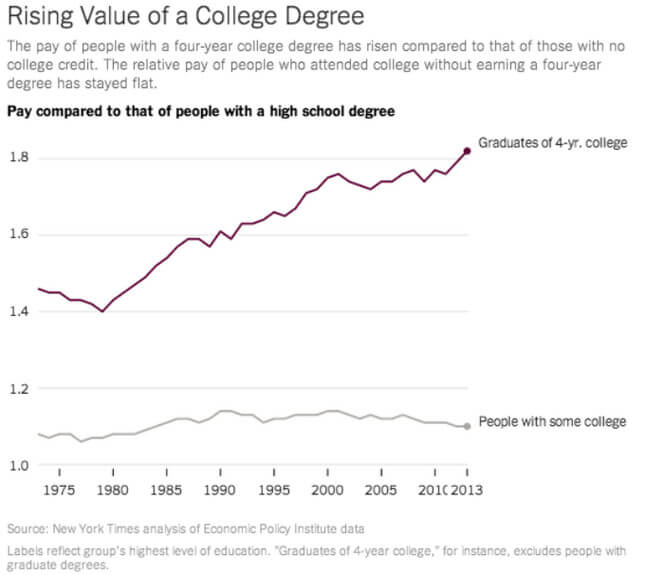Is College Worth It? Depends on What 'Worth It' Really Means
Latest

It’s graduation time for a lot of college students around the country. As they make their way across the stage to collect their diplomas—many of them saddled with tens of thousands of dollars in student loan debt and little or no job prospects—a dark question looms: Was it actually worth it?
It’s a hard question to answer. According to a report in The Wall Street Journal, pricey bachelor’s degrees aren’t paying off immediately for many students (especially those with Liberal Arts degrees) because they aren’t able to find jobs that actually require those degrees:
Those who have found employment aren’t necessarily putting their degrees to use. In 2012, 44% college graduates aged 22 to 27 were working in jobs that didn’t require a bachelor’s degree, the highest level in nearly two decades, according to the latest data from a Federal Reserve Bank of New York study released this year.
The elevated underemployment—skilled workers doing jobs that don’t require their education level—has been blamed on the economy’s slow recovery. And for recent graduates, the headwinds are growing. Jobs in which a bachelor’s isn’t needed tend to pay less and offer fewer hours than a generation ago. More graduates also are taking out heftier loans; their average debt size has more than doubled to $33,000 in the past two decades.

Over at The New York Times, David Leonhardt is sold on the idea that yes, college is worth it, based on new income statistics that point to higher earnings for those with bachelor’s degrees versus those without. In fact, it’s not even close, according to him:
The pay gap between college graduates and everyone else reached a record high last year, according to the new data, which is based on an analysis of Labor Department statistics by the Economic Policy Institute in Washington. Americans with four-year college degrees made 98 percent more an hour on average in 2013 than people without a degree. That’s up from 89 percent five years earlier, 85 percent a decade earlier and 64 percent in the early 1980s.
So, while you may not put that degree to use straight out of the gate, once you do your earning potential is going to far exceed that of someone who doesn’t have a bachelor’s. But it’s not going to be easy getting there, according to the Wall Street Journal:
The result for the class of 2014 is a widening gap between those that struggle out of the gate and those that succeed. A generation ago, a university degree was a VIP ticket to the middle or upper-middle class. Today, it is more like general admission—an entry into the venue but no guarantee of a good seat.
And even though the Journal concedes college graduates do earn more over a course of a lifetime—roughly $1 million more than a high-school graduate—those numbers don’t show all the variables associated with the the typical graduate’s experience. “[Obscured] in those widely quoted figures are the cost of college and the wide range of earnings. Mistakes can ripple through careers and personal finances for years.”
However, Leonhardt points out that while stories about students racked with debt and struggling to find work might make for good headlines, the numbers don’t necessarily support the narrative :
-

-

-

-

-

-

-

-

-

-

-

-

-

-

-

-

-

-

-

-

-

-

-

-

-

-

-

-

-

-

-

-

-

-

-

-

-

-

-

-








































